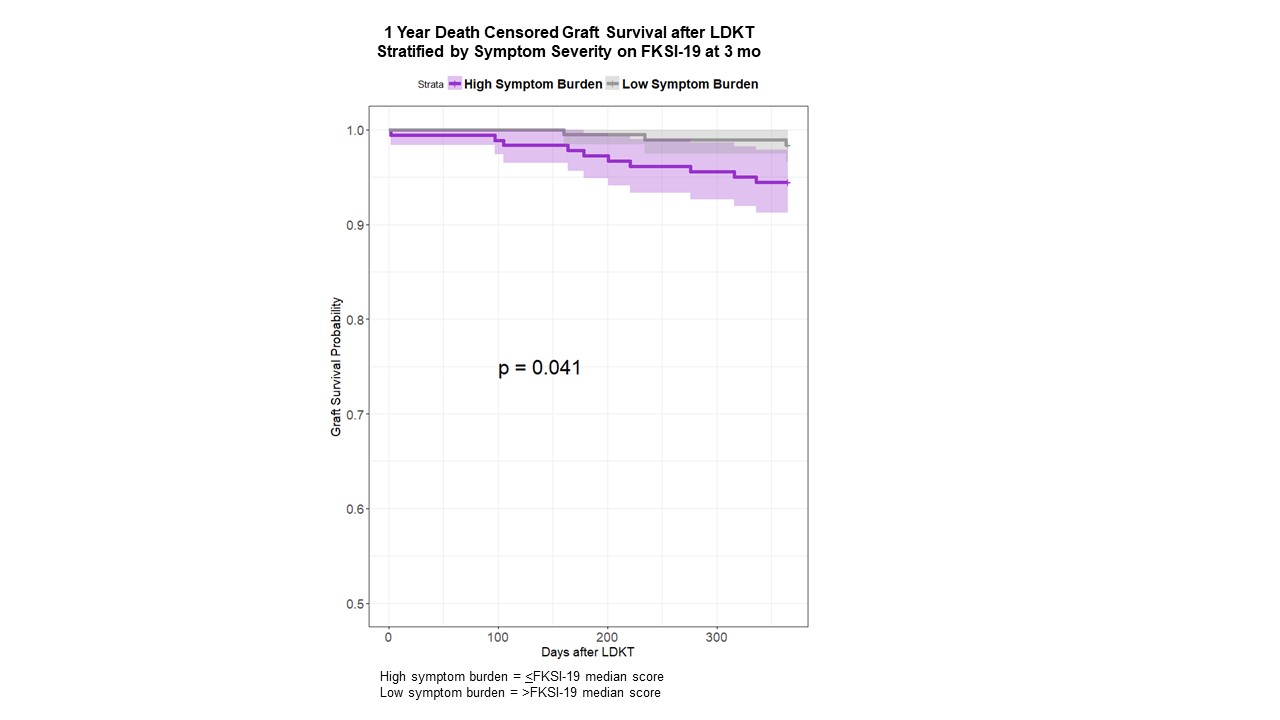Symptom Burden after Living Donor Kidney Transplant Measured with the Functional Assessment of Cancer Therapy – Kidney Symptom Index is Associated with Worse Transplant Outcomes
Northwestern University, Chicago, IL
Meeting: 2019 American Transplant Congress
Abstract number: A167
Keywords: Quality of life
Session Information
Session Name: Poster Session A: Biomarkers, Immune Monitoring and Outcomes
Session Type: Poster Session
Date: Saturday, June 1, 2019
Session Time: 5:30pm-7:30pm
 Presentation Time: 5:30pm-7:30pm
Presentation Time: 5:30pm-7:30pm
Location: Hall C & D
*Purpose: As the FDA and other stakeholders in transplantation look for fit-for-purpose (FFP) patient-reported outcome measures, there is a need to better understand symptom burden after living donor kidney transplant (LDKT), and identify the best measures to capture symptoms. To examine the validity of a potential FFP measure for LDKT patients, we determined frequency and severity of symptoms on the Functional Assessment of Cancer Therapy – Kidney Symptom Index (FKSI-19), and associations with health-related quality of life (HRQOL) and graft loss.
*Methods: We examined symptoms at 3 mo and 1 year post-LDKT among 404 patients transplanted between 11/2007 and 08/2016 using the FKSI-19. The FKSI-19 includes 19 symptoms (e.g., “I feel fatigued”) rated from “not at all” to “very much” with scores from ranging from 0-76, and higher scores indicating lower symptom burden. Severe burden for individual symptoms was defined as ratings of “very much”/”quite a bit” on the FKSI-19. We examined associations between the FKSI-19 score and individual symptoms at 3 mo with 1 year post-LDKT outcomes, including: 1) HRQOL using the SF-12 Physical Component Summary (PCS) and Mental Component Summary (MCS), each of which range between 0-100, with higher scores indicating higher HRQOL; 2) death censored graft survival (DCGS).
*Results: The most commonly endorsed severe symptoms on the FKSI-19 were: sleeping difficulties (21% at 3 mo and 1 year), fatigue (17% at 3 mo, 13% at 1 year), and poor appetite (15% at 3 mo, 16% at 1 year). Compared to patients with less severe symptoms, patients with severe fatigue had lower scores on the PCS: 38.8 vs. 50.2 (p<0.001; Cohen’s d = -1.25) at 1 year post-LDKT. Similarly, patients with worse appetite (49.9 vs. 54.2; p<0.001; Cohen’s d = -0.53) and more severe sleeping difficulties (49.2 vs. 54.8; p<0.001; Cohen’s d = -0.63) scored lower on the on the MCS. Patients with lower than median FKSI-19 scores at 3 mo post-LDKT had significantly lower 1 -year DCGS (plot). In addition, specific symptoms at this timepoint were associated with lower DCGS, including fatigue (91.8% vs. 97.4%, log rank p=0.03) and sleeping difficulties (90.9% vs. 97.4%, log rank p=0.02).
*Conclusions: Several individual symptoms and the FKSI-19 total score revealed suboptimal health among some LDKT recipients. Symptom severity shortly after LDKT may be good indicators of risk for 1 year graft loss. Additional research into ways the FKSI-19 can be leveraged as a FFP measure for evaluating post-LDKT health and treatment is needed.
To cite this abstract in AMA style:
Peipert J, Caicedo-Ramirez J, Ensor K, Friedewald J, Abecassis M, Cella D, Ladner D, Butt Z. Symptom Burden after Living Donor Kidney Transplant Measured with the Functional Assessment of Cancer Therapy – Kidney Symptom Index is Associated with Worse Transplant Outcomes [abstract]. Am J Transplant. 2019; 19 (suppl 3). https://atcmeetingabstracts.com/abstract/symptom-burden-after-living-donor-kidney-transplant-measured-with-the-functional-assessment-of-cancer-therapy-kidney-symptom-index-is-associated-with-worse-transplant-outcomes/. Accessed February 28, 2026.« Back to 2019 American Transplant Congress

